HR Assistants are fundamental in managing the administrative aspects of human resources functions and duties. They act as the supportive backbone that helps to maintain an organized and efficient HR office.
Skills necessary for an HR Assistant include a strong grasp of administrative tasks, proficiency in HR software, and excellent interpersonal and communication abilities.
Candidates can write these abilities in their resumes, but you can’t verify them without on-the-job HR Assistant skill tests.
In this post, we will explore 8 essential HR Assistant skills, 10 secondary skills and how to assess them so you can make informed hiring decisions.
Table of contents
8 fundamental HR Assistant skills and traits
The best skills for HR Assistants include Communication Skills, Organizational Ability, Recruitment Knowledge, HR Software Proficiency, Data Entry Skills, Confidentiality, Regulatory Knowledge and Problem Solving.
Let’s dive into the details by examining the 8 essential skills of a HR Assistant.
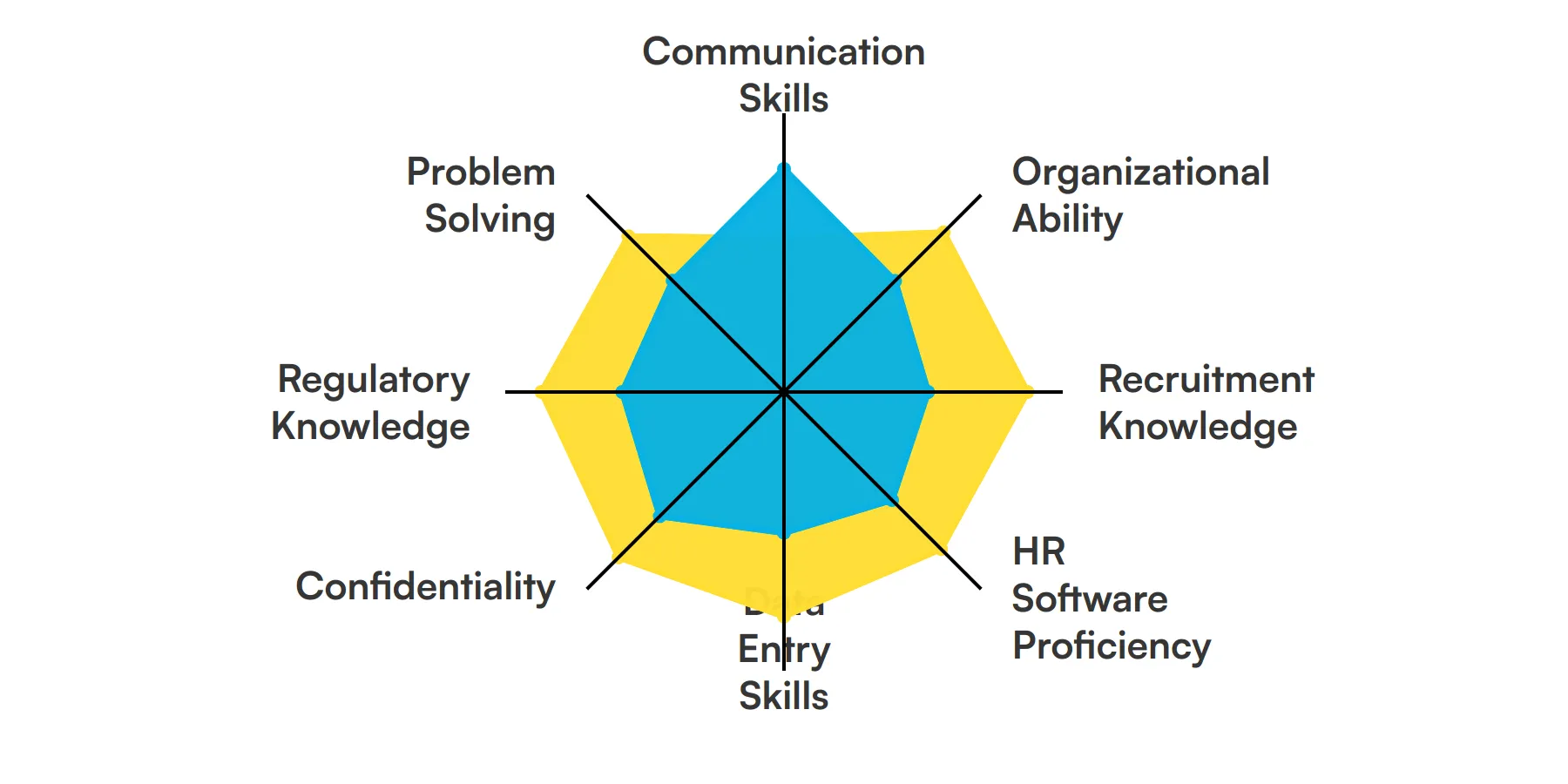
Communication Skills
HR Assistants need to communicate clearly and effectively with both internal team members and external candidates. They handle sensitive information and must be able to convey policies and feedback in a way that is both professional and understandable.
For more insights, check out our guide to writing a Communications Manager Job Description.
Organizational Ability
An HR Assistant must manage multiple tasks and deadlines, from scheduling interviews to maintaining employee records. Strong organizational skills ensure that all HR functions are performed efficiently and are up-to-date.
Recruitment Knowledge
Understanding the recruitment process is key for an HR Assistant. This includes knowing how to post job ads, screen resumes, and assist in the interview process to ensure the right candidates are selected for the organization.
HR Software Proficiency
HR Assistants will frequently use various software tools for payroll, scheduling, and employee management. Proficiency in these technologies is necessary to handle data accurately and support HR operations.
Data Entry Skills
Accurate and efficient data entry is crucial for maintaining employee records and processing information. An HR Assistant must be meticulous to avoid errors that could impact employee information and payroll.
Confidentiality
HR Assistants handle sensitive information, from personal employee details to contractual data. They must maintain confidentiality and integrity to protect employee privacy and company regulations.
Regulatory Knowledge
An understanding of employment laws and regulations is necessary to ensure that the company remains compliant with local and federal laws. This knowledge helps the HR Assistant manage risks and provide proper guidance to the organization.
Problem Solving
HR Assistants often face situations that require quick thinking and effective solutions, whether it’s resolving conflicts or addressing grievances. Strong problem-solving skills are essential to navigate these challenges smoothly.
10 secondary HR Assistant skills and traits
The best skills for HR Assistants include Multitasking, Attention to Detail, Interpersonal Skills, Adaptability, Report Generation, Event Coordination, Employee Relations, Training Coordination, Tech Savviness and Project Management.
Let’s dive into the details by examining the 10 secondary skills of a HR Assistant.
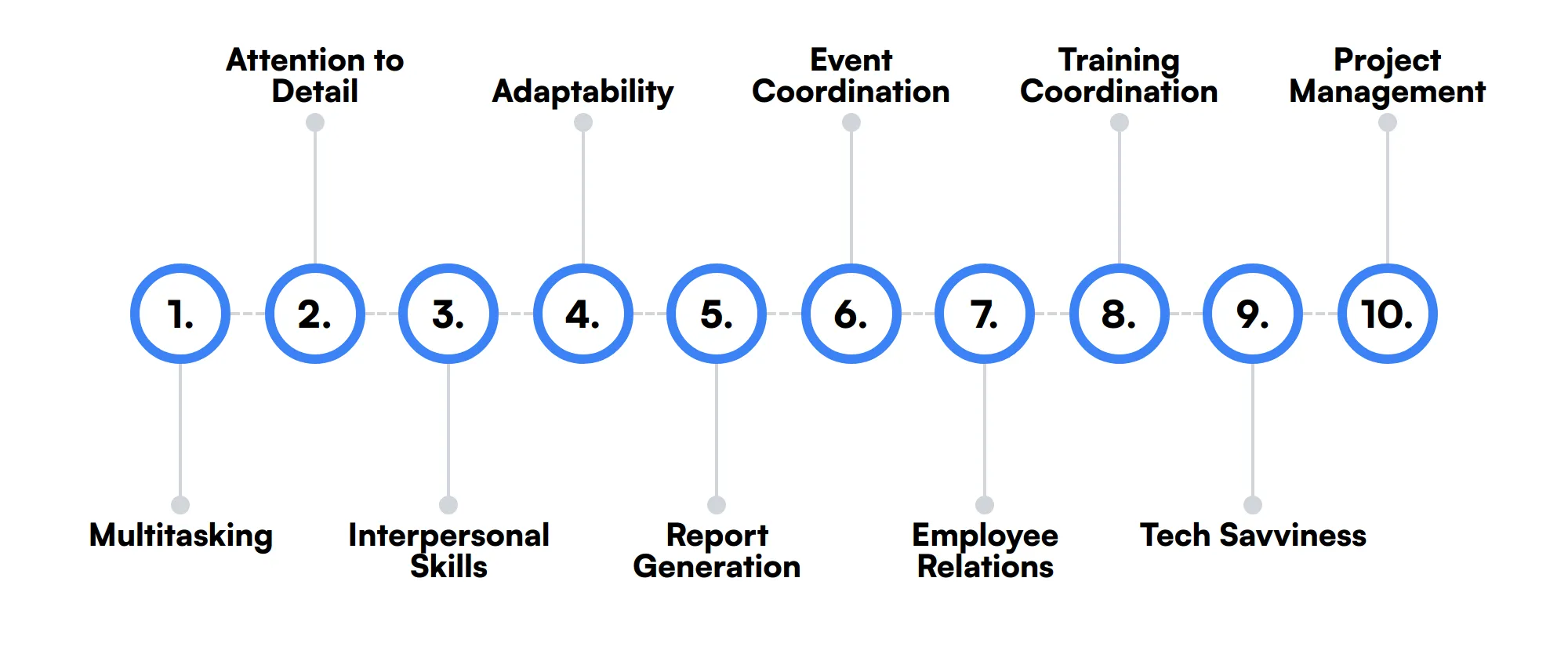
Multitasking
HR Assistants often juggle various tasks at once, from answering phone calls to updating databases. Being able to multitask effectively ensures that all responsibilities are met promptly.
Attention to Detail
This skill is crucial for reviewing documents and ensuring compliance with policies and regulations. An HR Assistant must be detail-oriented to catch potential errors before they become issues.
Interpersonal Skills
Building relationships within the company helps an HR Assistant to effectively support team dynamics and employee needs. Strong interpersonal skills aid in fostering a positive work environment.
Adaptability
The ability to adapt to changing circumstances and requirements is important for an HR Assistant, especially in dynamic work environments or industries.
Report Generation
Creating reports for HR metrics or employee performance evaluations is a common task. Skills in generating precise and informative reports can greatly aid in decision-making processes.
Event Coordination
HR Assistants may be involved in organizing company events or meetings. Skills in event coordination ensure that these activities go smoothly and meet their objectives.
Employee Relations
Understanding and managing employee relations helps in maintaining a harmonious workplace. An HR Assistant plays a role in mediating conflicts and ensuring that employee concerns are addressed properly.
Training Coordination
Organizing and sometimes conducting employee training sessions are part of the HR Assistant's responsibilities. Effective coordination ensures that employees are well-equipped for their roles.
Tech Savviness
A general comfort with technology helps HR Assistants utilize new tools and platforms that can improve HR processes and employee management.
Project Management
Some HR tasks may involve project management skills, especially when implementing new HR initiatives or policies. Being able to manage projects efficiently ensures successful outcomes.
How to assess HR Assistant skills and traits
Assessing the skills and traits of an HR Assistant is a critical step in ensuring you have the right person for the job. This role requires a unique blend of soft and hard skills ranging from excellent communication abilities to proficiency in HR software.
While resumes provide a snapshot of qualifications and experiences, they don't fully reveal a candidate's capability in handling real-world HR challenges. To truly understand a candidate's skills, hands-on assessments and structured interviews are indispensable. For instance, evaluating their problem-solving skills through scenario-based questions or testing their knowledge of recruitment processes and regulatory compliance can provide deeper insights into their practical abilities.
Incorporating skills assessments into the hiring process can significantly streamline candidate screening. Using tools like Adaface assessments, which are tailored to measure the specific skills listed above, can help you achieve a 85% reduction in screening time. These assessments are designed to evaluate a candidate's practical knowledge and proficiency in areas critical to HR functions, from data entry to maintaining confidentiality. Explore the variety of HR Assistant tests available at Adaface to enhance your hiring process.
Let’s look at how to assess HR Assistant skills with these 6 talent assessments.
Communication Skills Test
The Communication Skills Test evaluates candidates' communication skills, including verbal and written communication, active listening, and interpersonal skills. It is designed to assess their ability to effectively communicate with customers, colleagues, and stakeholders in various professional scenarios.
The test assesses their understanding of communication skills, situational judgement, attention to detail, critical thinking, and verbal reasoning. Candidates navigate through situational judgement questions, communication skills MCQs, and critical thinking scenarios to demonstrate their proficiency.
Successful candidates show strong verbal reasoning and critical thinking abilities, ensuring they can handle diverse communication challenges in a professional setting.
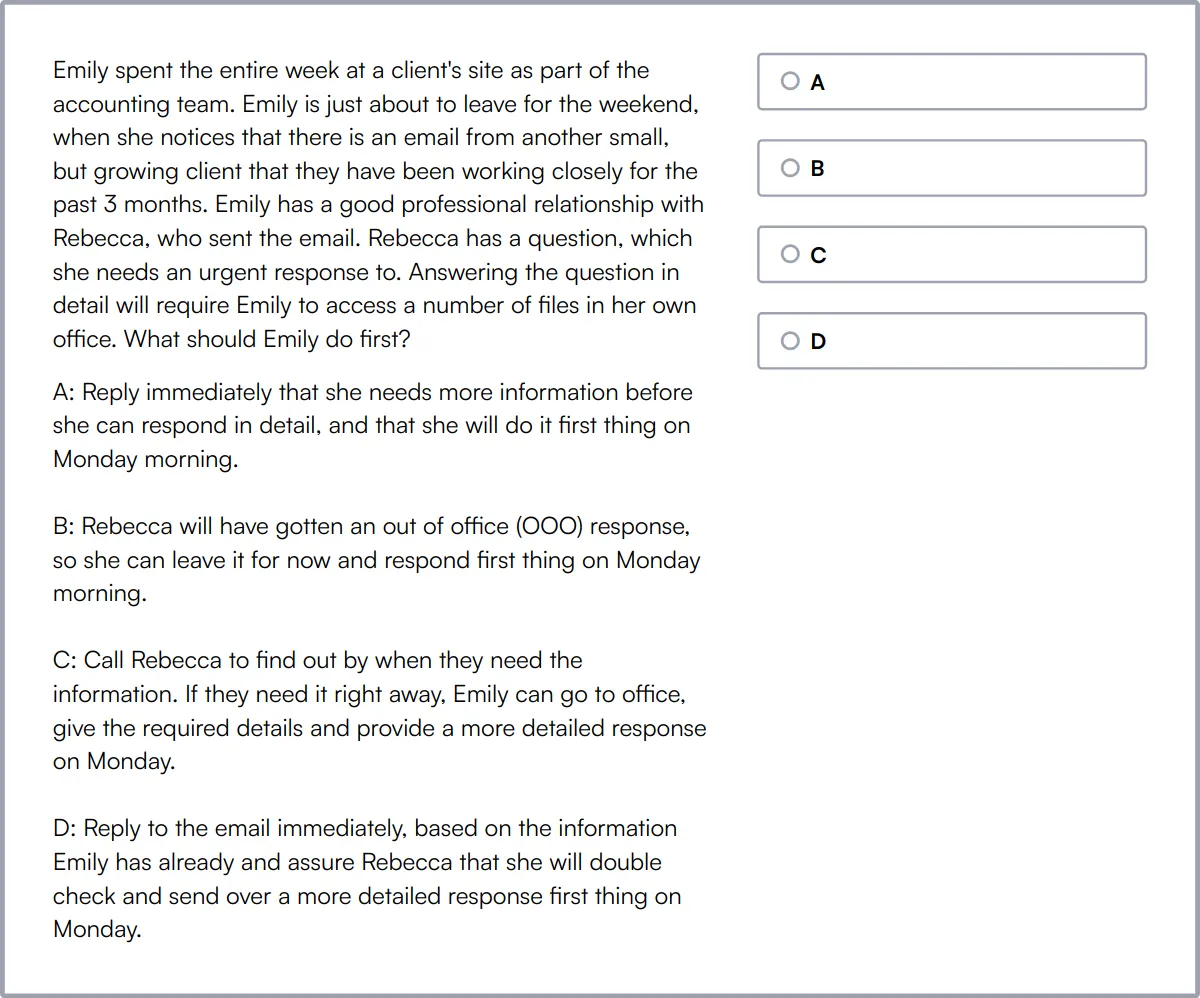
Administrative Assistant Test
The Administrative Assistant Test is a comprehensive assessment designed to evaluate a candidate's skills and aptitude for the role of an administrative assistant. It encompasses various aspects crucial to this role, such as organizational skills, time management, communication skills, attention to detail, problem-solving, and proficiency in using office software.
This test includes scenario-based questions to assess how a candidate would handle specific situations that may arise in an administrative assistant role. It covers organizational skills, time management, communication skills, attention to detail, and problem-solving.
High-scoring candidates demonstrate proficiency in managing schedules, handling correspondence, and dealing with confidential information, showcasing their readiness for administrative tasks.
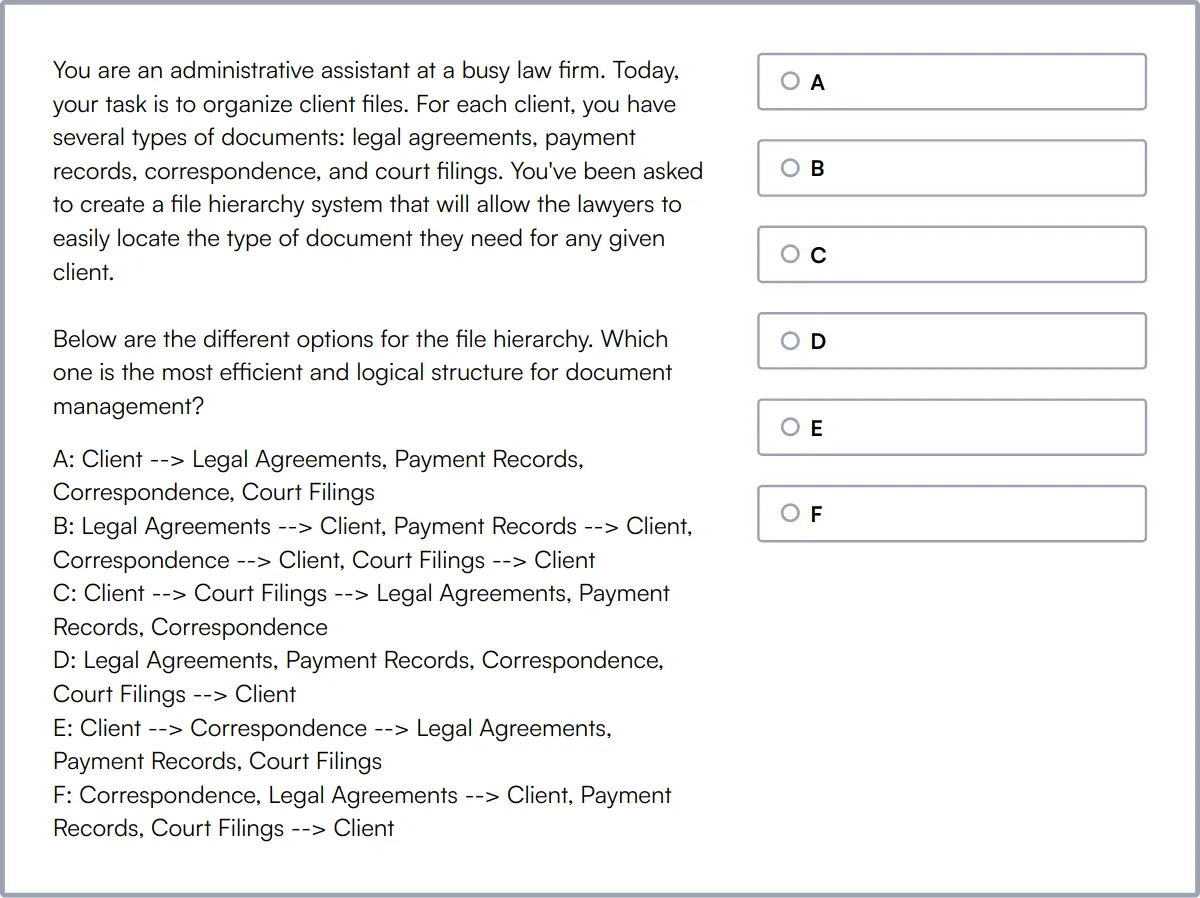
Talent Acquisition Test
The Talent Acquisition Test measures a candidate's proficiency in sourcing, recruiting, and onboarding qualified individuals. It also evaluates their skill in leveraging recruitment technologies and data analysis to fulfill the organization's human capital needs.
The test assesses logical reasoning, situational judgement, evaluation, interviewing, selection, candidate screening, skills assessment, job analysis, and job descriptions. Candidates navigate through talent acquisition MCQs and logical reasoning scenarios.
Successful candidates show strong abilities in candidate screening and job analysis, ensuring they can effectively manage the recruitment process.
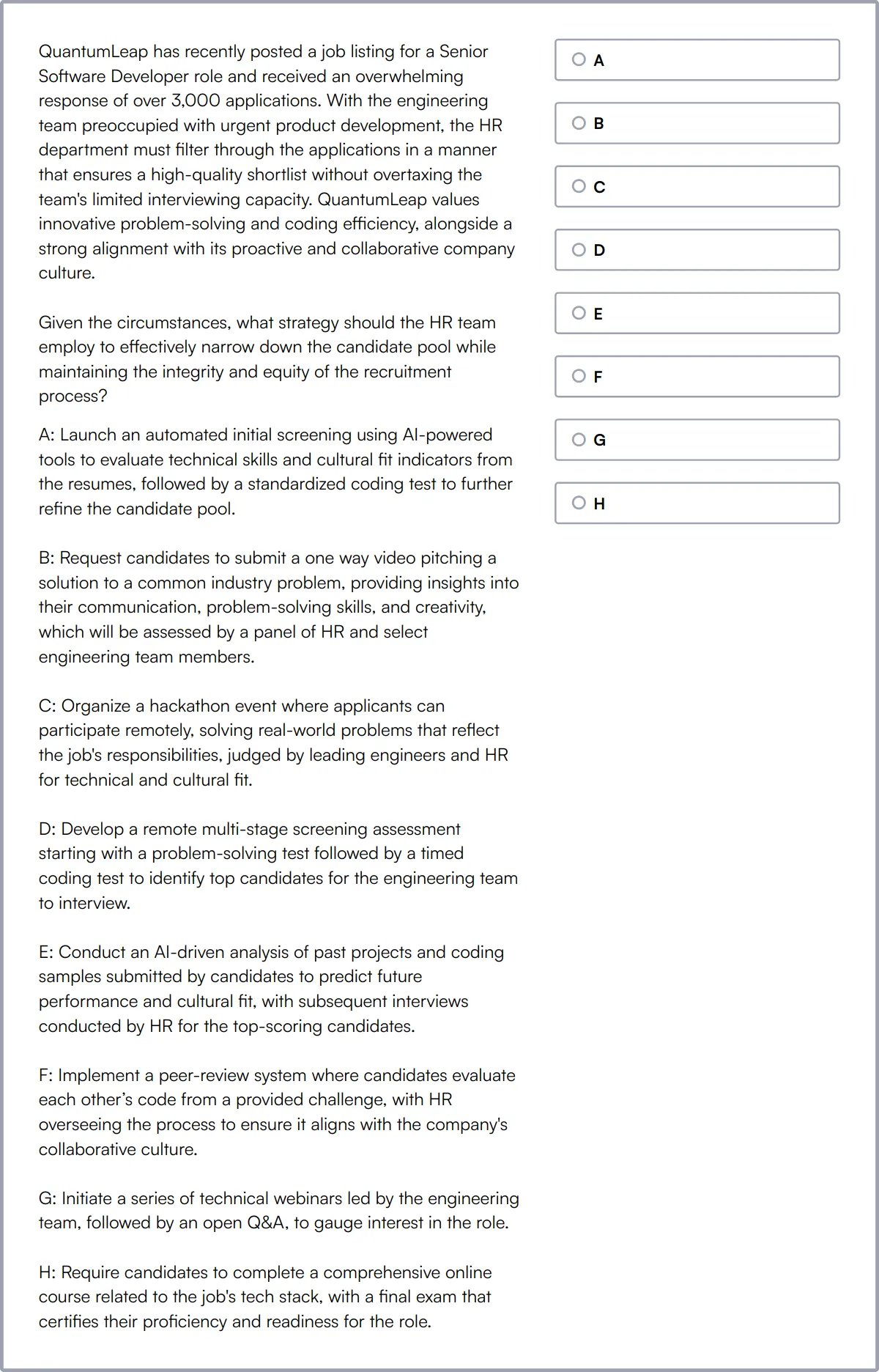
HR Test
The HR Test evaluates a candidate's ability to address common workplace challenges in staffing, aligning employee behavior with business goals, and utilizing HR software to provide comprehensive support to management and staff.
The test covers human resource management fundamentals, talent acquisition fundamentals, critical thinking, abstract reasoning, situational judgement, conflict management, and talent pipeline management. Candidates answer questions on talent acquisition, human resource management, and critical thinking.
High-scoring candidates demonstrate strong conflict management and talent pipeline management skills, ensuring they can handle HR challenges effectively.
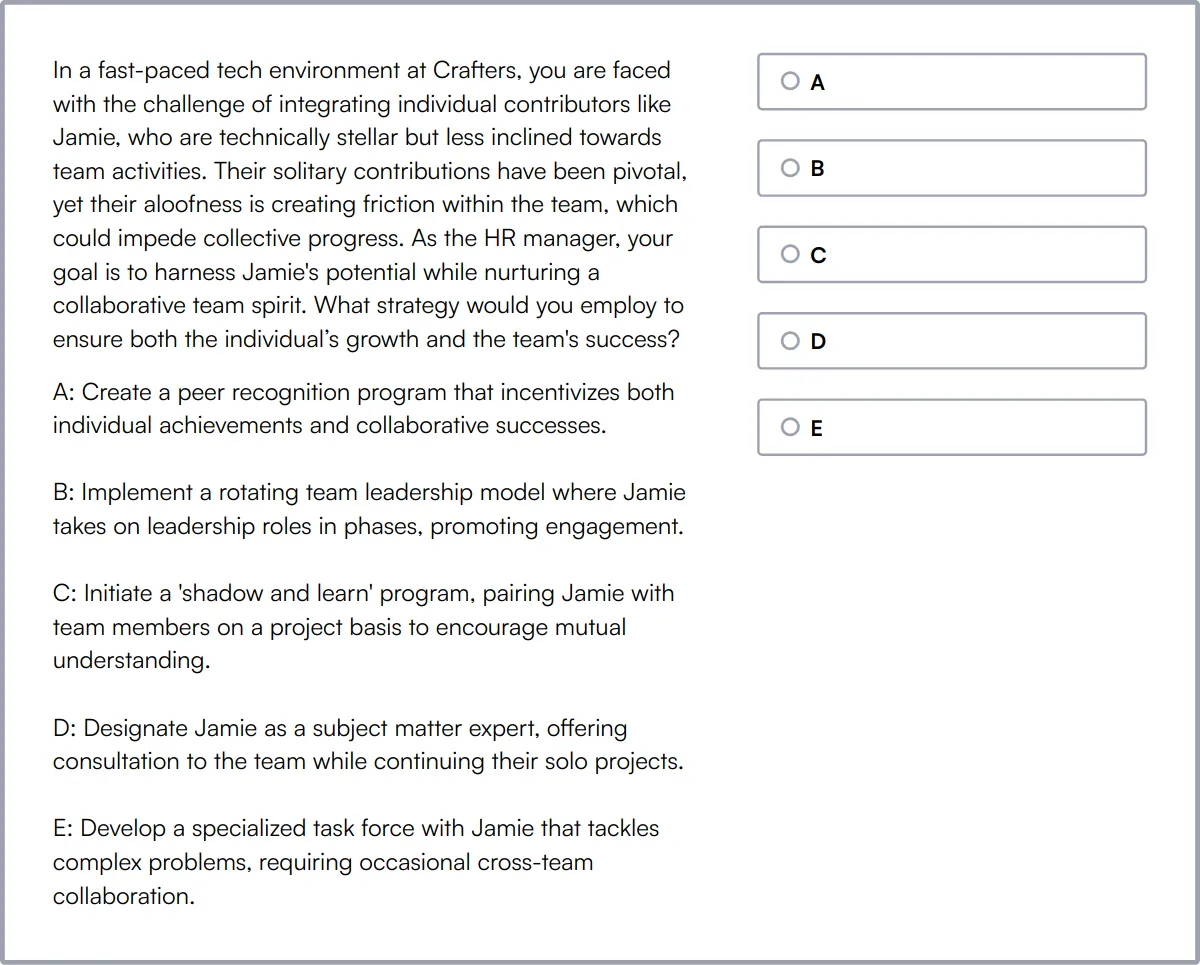
Data Entry Online Test
The Data Entry Test evaluates candidates on their speed and accuracy of entering data into a computer system. The test assesses skills such as typing speed, accuracy, data verification, attention to detail, proofreading, and the ability to navigate various software applications and databases.
The test includes questions on data entry, typing speed, accuracy, data validation, data verification, data formatting, data cleansing, data analysis, data management, and quality assurance. Candidates are tested on their ability to process large volumes of data quickly and accurately.
Successful candidates demonstrate high typing speed and accuracy, ensuring they can handle data entry tasks efficiently.
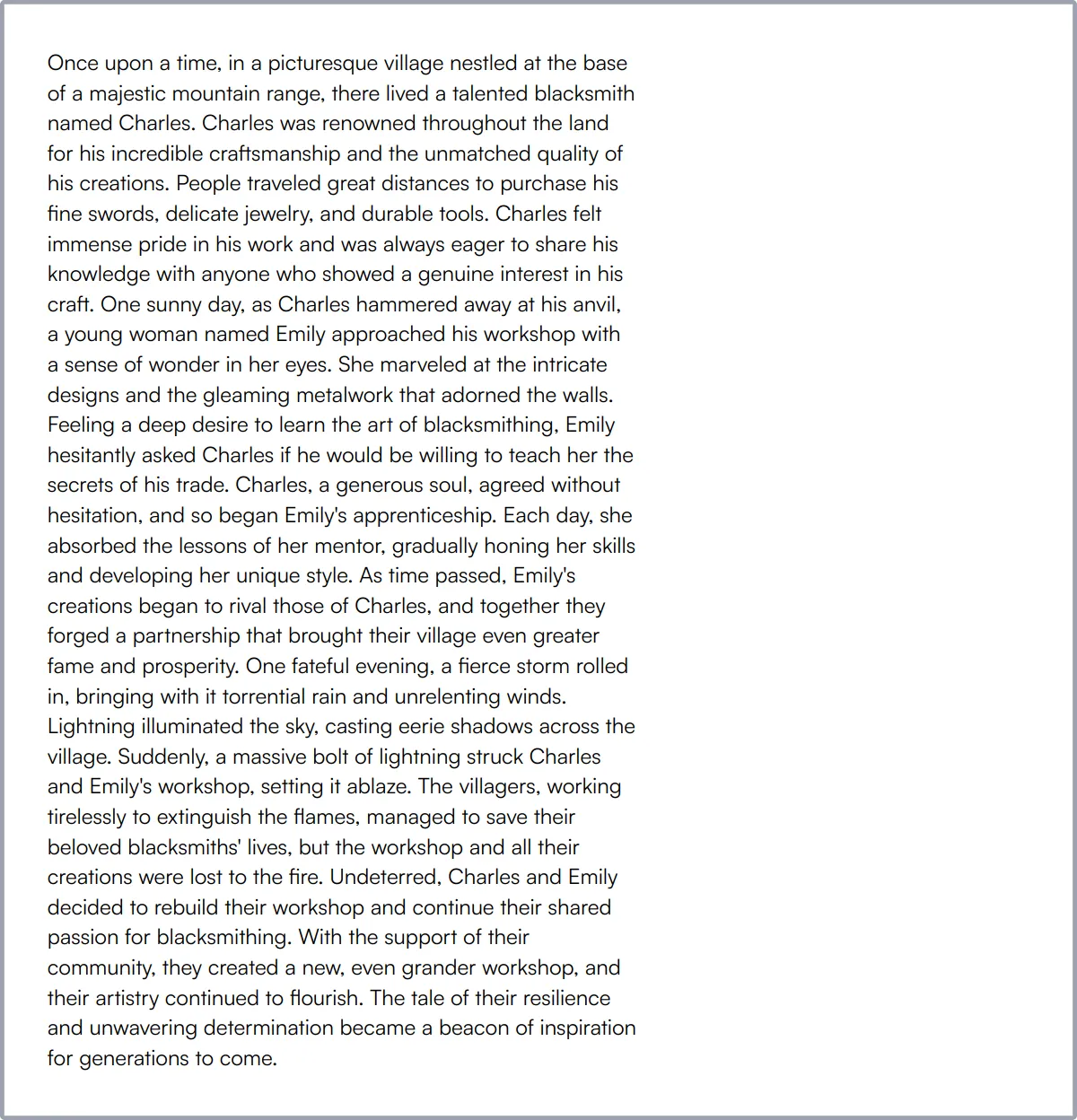
GDPR Online Test
The GDPR Online Test uses scenario-based MCQs to evaluate candidates on their understanding of GDPR regulations and best practices for data protection and privacy. The test assesses their ability to identify and evaluate data protection risks, develop and implement GDPR compliance policies, and ensure the security and privacy of personal data.
The test covers data privacy, data protection, data security, data breach, data processing, consent management, data retention, data subject rights, data transfer, data controllers, and data processors. Candidates navigate through GDPR MCQs to demonstrate their proficiency.
High-scoring candidates show strong understanding of GDPR compliance and data protection practices, ensuring they can manage data privacy effectively.
Summary: The 8 key HR Assistant skills and how to test for them
| HR Assistant skill | How to assess them |
|---|---|
| 1. Communication Skills | Evaluate clarity and effectiveness in verbal and written interactions. |
| 2. Organizational Ability | Check ability to manage multiple tasks and maintain orderly records. |
| 3. Recruitment Knowledge | Assess understanding of hiring processes and candidate evaluation. |
| 4. HR Software Proficiency | Test familiarity with HR management systems and software tools. |
| 5. Data Entry Skills | Measure accuracy and speed in entering and managing data. |
| 6. Confidentiality | Verify ability to handle sensitive information with discretion. |
| 7. Regulatory Knowledge | Evaluate understanding of labor laws and compliance requirements. |
| 8. Problem Solving | Assess capability to identify issues and implement solutions. |
HR Test
HR Assistant skills FAQs
What are the key communication skills required for an HR Assistant?
HR Assistants should be able to clearly convey information both in writing and verbally. They need to be effective listeners to understand employee concerns and communicate policies and procedures.
How can organizational ability be assessed in HR Assistant candidates?
Assess organizational skills by asking candidates to describe how they manage multiple tasks and deadlines. You can also give them a scenario-based task during the interview to see their planning and prioritizing in action.
What HR software skills are important for HR Assistants?
Proficiency in HRIS (Human Resources Information Software) and other HR management systems are important. Familiarity with Microsoft Office, especially Excel, is often required for data management and report generation.
Why is confidentiality important in the HR Assistant role?
HR Assistants handle sensitive information, from personal employee details to contractual data. Maintaining confidentiality is key to protecting employee privacy and company integrity.
How can you evaluate problem-solving skills in potential HR Assistants?
During interviews, present candidates with common HR issues, such as handling conflicts or scheduling problems, and ask them to propose solutions. This reveals their ability to analyze situations and use judgment effectively.
What should HR Assistants know about regulatory compliance?
HR Assistants need to be aware of employment laws and regulations such as FMLA, ADA, and EEO compliance. Knowledge can be assessed through questions related to hypothetical scenarios or past experiences.
How important are interpersonal skills for an HR Assistant?
Interpersonal skills are critical as HR Assistants frequently interact with employees at all levels. They must be approachable, empathetic, and able to build strong relationships.
What role does adaptability play in the effectiveness of an HR Assistant?
Adaptability is key in HR due to the dynamic nature of human resources. HR Assistants must be able to handle unexpected changes and adapt their strategies to meet evolving company and employee needs.
Assess and hire the best HR Assistants with Adaface
Assessing and finding the best HR Assistant is quick and easy when you use talent assessments. You can check out our product tour, sign up for our free plan to see talent assessments in action or view the demo here:

40 min skill tests.
No trick questions.
Accurate shortlisting.
We make it easy for you to find the best candidates in your pipeline with a 40 min skills test.
Try for freeRelated posts
Free resources



